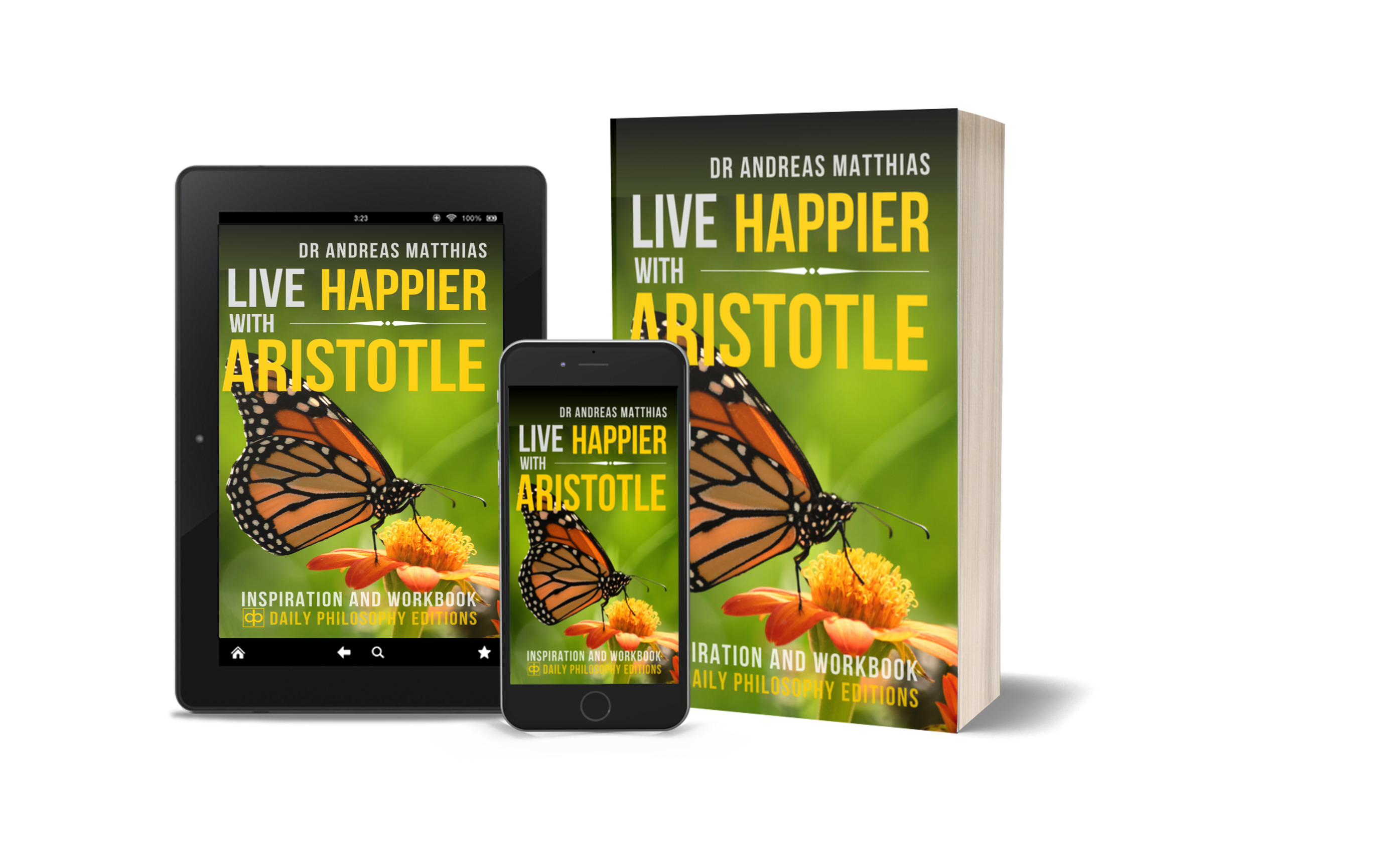How to Live an Aristotelian Life
Become happy through being good
This is the first week in our One Year, Six Ways challenge, in which we try to experience six different philosophies of life in our own, everyday lives. And we begin with Aristotle, one of the fathers of Western philosophy.
So how can we utilise Aristotle’s theories about happiness in our own, everyday lives? Read on.
Can I be too honest?
Aristotle’s view of life starts with the concept of virtues. Virtues are good properties of one’s character that are beneficial to oneself and to others. Think, for instance, of courage, honesty, or kindness.
But not any amount of these virtues is good. One can be too courageous, for example. We would call such a person reckless, perhaps. They do have courage, but they are unable to see that sometimes it’s wiser to be less courageous in order to reach a good outcome. Too much honesty might be hurtful. Too much kindness and one is a doormat. So, for Aristotle, the trick is not only to have the virtues but to be able to control them so that one has them always to the right amount: the amount that is optimal for every situation that one encounters.
The point Aristotle wants to make is that every single situation calls for a different amount of every virtue, and wisdom consists in knowing exactly how much that right amount is.
It is important to see that this is not always some “middle” amount. There are situations where zero courage is the right amount: for example, when you’re out on an African photo-safari and a lion suddenly stands in front of you, licking its lips. Then it would be reckless and stupid to do anything but get into your car and close the windows. There are, equally, situations in which the right amount of courage is an extreme amount. For example, if you are a firefighter, called to rescue people from a burning house. In this case, you can’t say “Oh, but I’m supposed to have only a middle amount of courage. Let someone else go in there.” It’s your job to rescue these people, so the right amount of courage in this situation would be what to others might seem reckless. The point Aristotle wants to make is that every single situation calls for a different amount of every virtue, and wisdom consists in knowing exactly how much that right amount is.

Aristotle (384-322 BC), born in Stageira, Greece, is one of the most influential philosophers who ever lived. He worked not only in philosophy, but also wrote dozens of books on all topics, from astronomy and biology to literary theory.
Three types of people
Aristotle emphasises that the virtues need to be deep and balanced. What does he mean by that?
“Deep” are virtues that are so much part of our character that we do, ideally, not even consciously perceive that we are acting virtuously. Virtues are essentially a kind of skill, says Aristotle, and like every other skill, they need to be practised until they are performed almost automatically.
For example, let’s say you walk along the street and out of the back pocket of the person in front of you falls a stack of dollar bills. They haven’t noticed and walk on, while the money now is right in front of your feet. What do you do next?
First, you could pick up the money and run. This could be either because you are a bad person, a criminal, a thief. Or you are just so tempted by the money that you cannot bring yourself to do the right thing. In any case, the money is now yours – but Aristotle’s scorn is too. He would say that you are akrates, a person unable to resist their temptations, who are therefore acting in a morally wrong way. A bad egg, basically.
Second, you could look at the money and think: Well, that’s a new iPhone. You would pick it up, count it, dream of what else it would buy you. But then, you also think about Aristotle, about your sixth-grade school teacher who was so proud of your good character, of the One Year Six Ways experiment… and you feel that you just can’t do it. You are not that type of person. You run after the guy who lost the money and hand it back to them. Aristotle would say that you are someone who’s on the way to goodness, but not yet quite there. You are enkrates, which means you are still tempted to do the bad thing, but you can, after some inner struggle, resist the temptation (great Youtube video on resisting temptation) and do the right thing in the end.
The third option is the best for Aristotle: without thinking, without hesitating even a second, you call the guy in front of you, pick up the money and hand it to them. If you act like that you are, in Aristotle’s words, sophron, a perfectly developed, moral human being. The goal of every human life, whether we know it or not, is to reach this stage of moral perfection because only then are we truly human and truly beneficial to ourselves and to others.
Live Happier with Aristotle: Inspiration and Workbook.
In the book to this series articles you're reading right now, philosophy professor, founder and editor of the Daily Philosophy web magazine, Dr Andreas Matthias takes us all the way back to the ancient Greek philosopher Aristotle in the search for wisdom and guidance on how we can live better, happier and more satisfying lives today.
Get it now on Amazon! Click here!

From child to Gandalf
Look also at children, Aristotle would say: we all begin the journey of life as little monsters that are focused only on their own benefit. Babies are not altruistic, small children want to grab everything that they find attractive and take possession of it. Much of the early education we give our children is meant to teach them that one cannot always have everything. They have to learn to share and to resist the temptations of life. When they grow up, they are often in the second stage: teenagers might occasionally be tempted to lie or to steal, young lovers might occasionally hurt others, young people might need time to learn how to control their urges and their emotions and do the right thing even if they don’t feel like it. But hopefully, they will also grow out of this stage and reach the third stage of moral development, where they will always act morally right – a kind of mild, wise old age that we idealise in literary figures like Gandalf and Obi Wan Kenobi: these are not impotent old men – they can and do fight for the good. But they have reached a stage in which they are not any more tempted by anything to act in a morally bad way.
It is interesting how much our culture follows Aristotle when it creates its visions of ideal men: both in Star Wars and in the Lord of the Rings it is the temptation that is at the centre of the moral conflict of the story: the power of the dark side, the power of the one ring. And the distinguishing feature of these ideal men is not their youth, their strength, their beauty, their eloquence, their wealth: it is their ability to resist the temptation. They have, ultimately, reached the stage of being sophron.

Becoming proficient
But then, how can we become sophron? How can we reach this ultimate stage of human development? What is the secret to becoming truly good?
We need to practice goodness, says Aristotle. Being good is a skill, and just like any other skill we need to practice it in order to improve at it. And this is the reason why children cannot be wise. This is the reason why Gandalf is always an old man (or woman): acquiring that skill needs time.
Otherwise, becoming wise and good is just like learning to write or to play the piano. In the beginning, one gets it all wrong. Children have a horrible time trying to keep “b” and “d” apart when they learn to write. Piano beginners are confused by all those dots on the different lines of a music sheet and how the dots correspond to the keys of the piano and how the fingers correspond to the keys. In the beginning, it all seems hopeless.

Photo by David Vilches on Unsplash.
But then, slowly, through relentless exercise, day after day, things start to make sense. The child learns to write, the piano learner is able to play simple melodies. But they are still tempted to get it wrong: a difficult word will be written rongli, a difficult piano piece will end in a frustration of knotted fingers and broken chords. It is only when one has reached a stage of expertise that one is not tempted to make any mistakes any more. Neither I nor you would be tempted to write simple words wrongly. A proficient piano player would never be tempted to get their fingers on the wrong keys. Being sophron means that one does the right thing automatically, without ever needing to think about it and without even being tempted to make a mistake.
Functioning well
For Aristotle, “being good” means nothing else than “functioning well as a human being.”
This is the extension of how we use “good” in relation to things. A good pen is a pen that writes well. A good car is a car that drives well. A good musician is a person who plays music well.
But what, then, is a good human being in general?
It is, Aristotle says, doing well what human beings are meant to do. And what is that? It is “exercising their virtues in accordance with reason.” So here you have the two elements together. The virtues are what we are meant to exercise – but this has to be done in accordance with reason. And this is where the moderation and the wisdom of deciding the right amount of virtue comes in. The reason is what tells us what the right amount of virtue is in any specific situation.
In the end, the one who acts like that will realise their full potential as a human being; in the same way as a good pen realises the full potential of a pen, and a good car realises the full potential of what a car can be.

If you try to moderate your virtues and to apply them perfectly, using your reason and practising throughout your life, you will reach a point where the exercise of these virtues will have become automatic. And, as a result, you will be living the best possible, the most rational, the most satisfactory life available to human beings.
He calls this state eudaimonia, which in Greek means something like “being guided by a good spirit.” A life that’s charmed, we might say, a life that is guarded by angels.

A timeline of Aristotle’s life shown over a map of ancient Greece.
Everything is connected
It is important to see how for Aristotle everything is connected with everything else. One cannot become perfect in isolation, in the same way as a pen or a car cannot develop their full potential without the right environment.
A good pen is useless if I don’t have good paper. Trying to write on a stone floor with a good pen will not allow me to appreciate the pen’s good qualities. A pen also needs good ink. If the ink is too thick or too watery then the good pen will write badly. And finally, in order to show off its full potential, the pen must be held by the hand of someone accomplished in calligraphy. Give a good pen to a monkey and it will not be able to write well.
So the goodness of the pen is not entirely a quality that’s inherent to the pen. A good pen can only reach its full potential if it is embedded in a context of other things that are equally good. A good pen needs a good calligrapher, good ink and good paper – without these, it’s useless.

Photo by Baciu Cristian Mihai on Unsplash.
Similarly, a human being cannot reach their full potential in isolation. They’ll need friends who are equally good and who’ll help them along the way. They’ll need good schooling and education. They’ll need some moderate wealth. They’ll need to be healthy. Aristotle does not mean to say that poor people or hospitalised patients are unable to live good lives – but it will be a lot harder for them. In order to make the experiences that one needs to develop one’s virtues, one needs a supportive environment. And the better the environment, the easier it will for the individual be to reach eudaimonia.
And this is how one’s private striving for happiness connects with Aristotle’s ethics: We can only reach our full potential together with others. If everyone does their own job well, if everyone helps others and is beneficial to them, then we will all profit on our journey.
For example, right now, you are interested to pursue your full potential as a human being by understanding Aristotle (among many other things that happen in your life). But for this to work, you depend on the Internet, on which you read this text. You depend on your browser working, on the power grid to supply your home with electricity, on your partner’s cooking to keep you fed while you read this – and on a myriad other things that people supply to you. If they don’t do their jobs well, your own eudaimonia will suffer. Conversely, if you don’t do your job well, whatever that is, someone else’s striving for perfection will be set back.
This is a powerful thought: that we are all in this together. Selfishness will not lead to happiness in Aristotle’s world. We must strive to be the best we can be to others so that they, in turn, can be their best selves; and in this way, they will profit us and enable us to develop even further. Perfection in life is, fundamentally, a cooperative affair.
This becomes nowhere as clear as in the social circles that we build around ourselves: a family member can only flourish if the rest of the family does. A person among their friends can only excel if the others do too. An employee can only reach their maximum professional potential in a company that works well and where everyone strives to be their best worker.
And so, in the end, it’s in everyone’s own interest to support and to help everyone else. Because no one is an island, and we will all, in the end, succeed or fail together.
Live Happier with Aristotle: Inspiration and Workbook (Daily Philosophy Guides to Happiness).
In this book, philosophy professor, founder and editor of the Daily Philosophy web magazine, Dr Andreas Matthias takes us all the way back to the ancient Greek philosopher Aristotle in the search for wisdom and guidance on how we can live better, happier and more satisfying lives today.
Get it now on Amazon! Click here!

Make sure to subscribe so that you don’t miss any posts! Thanks for reading!





